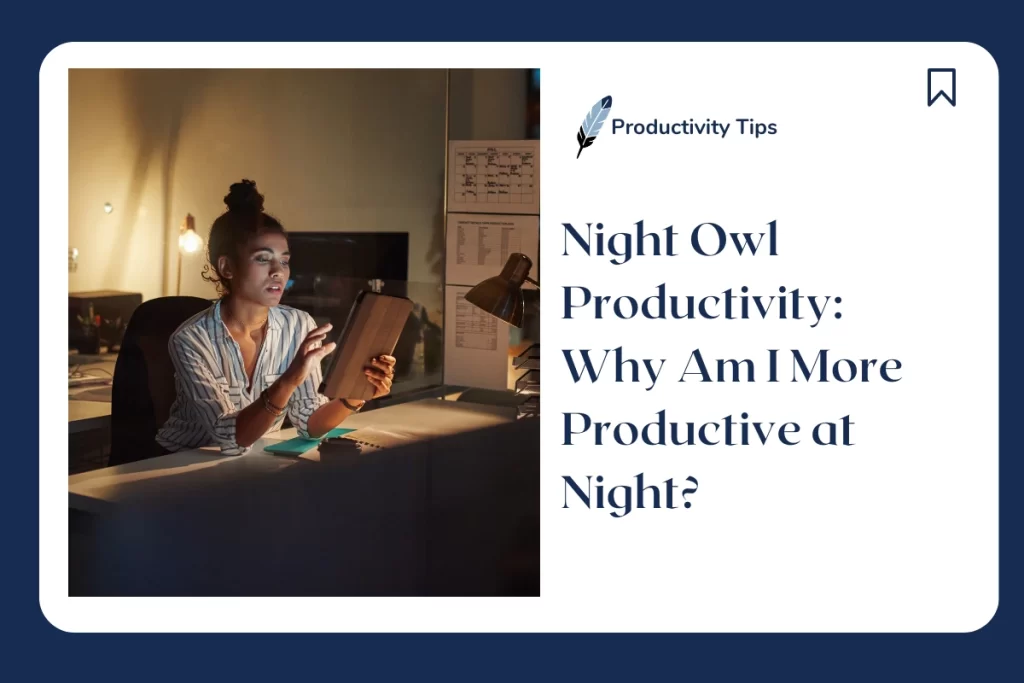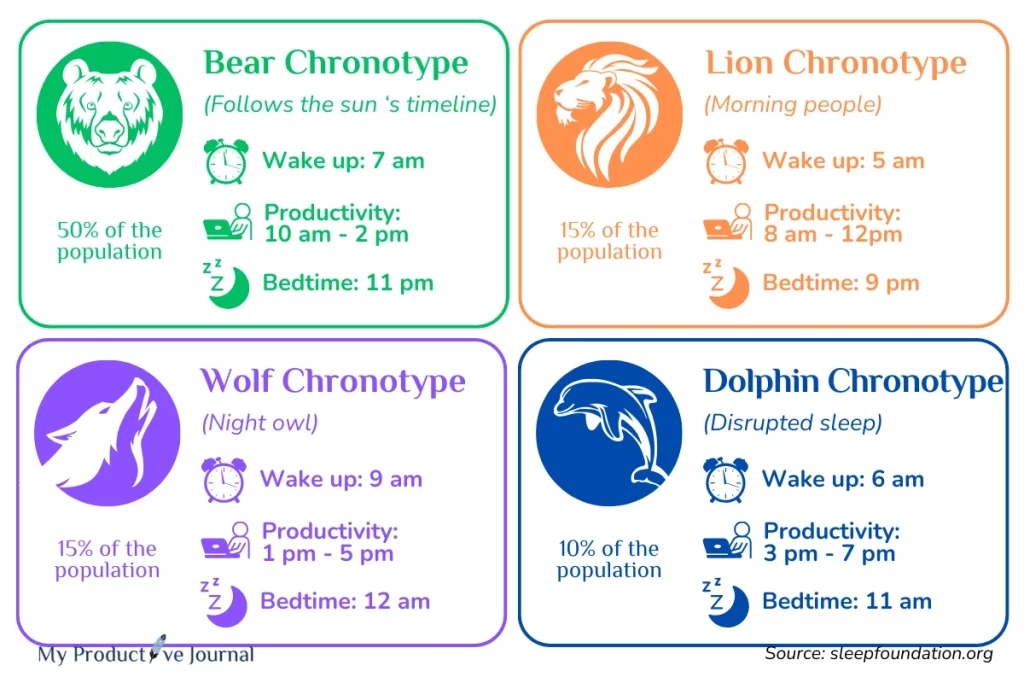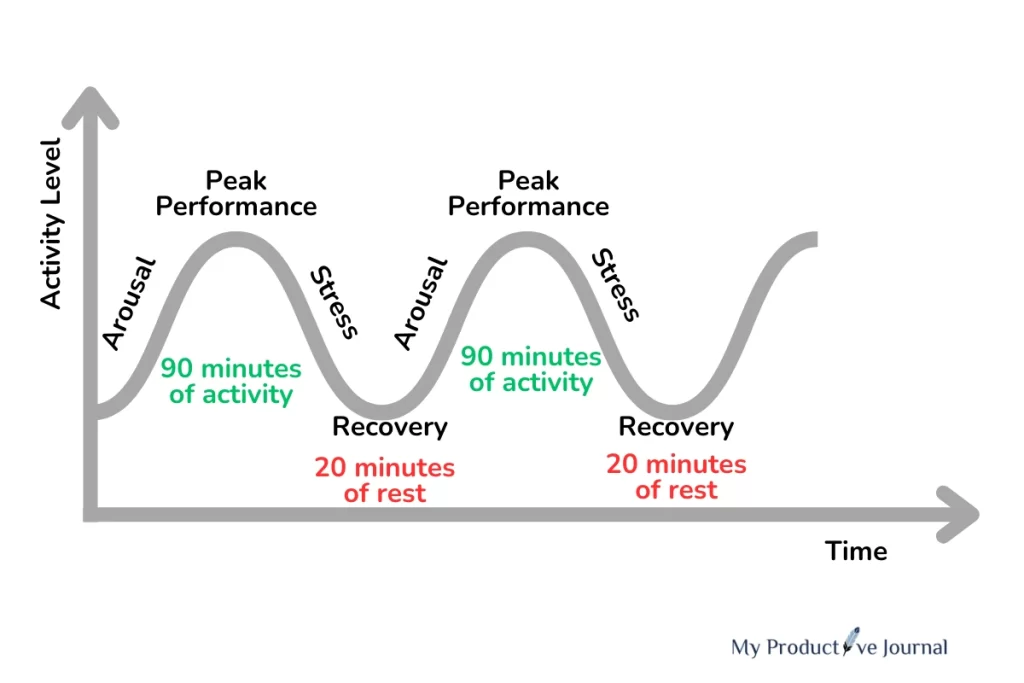If you’re an evening person, have you ever asked yourself, “Why am I more productive at night?”

Waking up in the morning, preparing and heading to work is the general routine that most people do. But some prefer the contrary.
Being a night owl myself, I can complete more tasks during the evening time than in the daytime. That’s mainly because my household is very busy the whole day.
Evenings provide me solace and focus to do whatever task I need to complete. During the day, I am either focused on my day-to-day roles and responsibilities as a father.
With the surge of work-from-home jobs, being a night owl became a rising trend, as well. You might be wondering how people are more productive at night than during day time.
This article will help you find out. So keep reading to learn more.
Table of Contents
Why Am I More Productive at Night? 12 Factors
1) Chronotype

Chronotype is your inclination to sleep at a particular time of the day. This is where you could classify if someone is an early bird or a night owl. But our topic will be dealing with night owls.
How does this affect your productivity? Your chronotype influences when you feel sleepy, how you eat, exercise, and other aspects of your body, like temperature, mood, and energy. Other factors may include your genetics, environment and the culture you belong to.
There are 4 kinds of chronotypes: the lion (a.k.a early birds), the bear, the wolf (a.k.a night owls) and the dolphin. Each type has an estimated waking hour, a certain time when one is most productive, and an approximate bedtime or feeling of sleepiness.
The lion chronotypes are your early birds, as they wake up at 4 AM and sleep earlier than the other types. They are most productive in the mornings, but they also have a hard time joining social events in the evenings.
The bear chronotypes tend to follow the traditional daytime schedule, where they wake up at around 7 AM and sleep at about 11 PM. They are mostly similar to the lion types, but compared to them, the bear types have more time to be sociable in the evenings.
The wolf chronotypes are your night owls. The wolves wake up at around 9 AM-10 AM and sleep at midnight. They are most productive in the afternoons. Wolves are creative and more focused during nighttime and are very open-minded.
The dolphin chronotypes are your insomniacs. They’re called “dolphins” because real dolphins can remain alert while sleeping. They rarely follow a wake-sleep routine and have the ability to be most productive whenever they’re awake. They can also sleep anytime once their minds are relaxed.
Take note that a consistent sleeping pattern will improve your brain’s focus and efficiency on daily tasks. It works differently for others, so you must observe yourself when you awake, when you feel sleepy and how long your sleep is.
2) Ultradian Rhythm

The ultradian rhythm is a cycle of 90-minute periods of high-level productivity and concentration, followed by 20-minute periods of rest, over the whole 24-hour period.
To compare, the ultradian rhythm is a cycle that repeats more than once. Meanwhile, the circadian rhythm is the 24-hour cycle itself that determines your body’s alertness, sleep patterns, and appetite.
Working with your ultradian rhythm will benefit your productivity to its greatest potential. By knowing this, you can determine how long you can focus on accomplishing a task. It also helps you get some rest during certain times of the day throughout the cycle.
So, you don’t need to stressfully devote yourself to a task until it’s finished in hours. By knowing your body clock, you can be more productive by grinding for 90 minutes and resting for 20 minutes.
As a night owl, it means your cycle may start at around 1pm. This, of course, depends on your working habits, late-night activities, and your sleeping routine, too.
3) Peace and Quietness of the Night
Depending on where you live, the evening’s quietness and solace provide a reasonable time to concentrate on any task you need to progress or finish.
So the question that begs to answer: Why is night better than day? Evenings are a more productive time as it is generally quiet and calm.
This comes with the fact that our stress levels are significantly lower at night than during the day. Our bodies are wired to relax and sleep at night time and be awake and work during the day.
If you then want a suitable time to have a peaceful, quiet time, you may find being a night owl as a good fit for your work routine.
4) Longer Hours of Concentration
So, why do I focus better at night? Or a better question would be, “Why can I only focus at night?” It’s the evening that brings peace and calmness.
In turn, it allows you to concentrate better on your tasks. Plus, you won’t have too many distractions during the night, compared to the heavy workload you encounter during the day.
There are still some who can focus on their work during the daytime, but evening owls tend to be more productive at night. According to a recent study, night workers are more able to concentrate than their daytime counterparts.
Thanks to longer hours available, you can start and continue working without even noticing the time passing by.
5) Creativity Peaks at Night
I noticed and asked myself, why does my brain work better at night? Is it because of my diet or a mental state that I just find myself in? Creativity has something to do with these two aspects.
Since there are little to no distractions, and the body has less stress to deal with during nighttime, these factors encourage creativity.
According to a study, night owls are more creative at night, especially when staying up too late. It shows that they have a higher tendency to be creative, compared with morning people.
6) Flexible Sleeping Pattern
Having a sleeping pattern relieves you from stress and allows your brain to rest from day-to-day activities. This is different when it comes to night owls.
But why is it called ‘flexible’ when it seems like night owls sleep at around the same length as morning larks? It’s flexible in the sense that they can sleep at different lengths and still be energetic and productive.
Of course, it’s different for everyone. If you find yourself full of energy with just 5 hours of sleep, that’s good for you. A healthy diet, an active lifestyle, and productive habits affect your overall sleeping quality. Otherwise, you might wake up drained despite sleeping for a full 8 hours.
You should also have a conducive place for sleep. You can dim the place similar to nighttime, take short naps when needed, and set a consistent sleep schedule regardless of your sleep length.
7) Genetic Predisposition
Humans are genetically wired to work during the day and sleep at night. This circadian body clock is the generally accepted way of life. But there are still a few of those who prefer working at night, just like in historical times.
In hunter-gatherer societies, there were fragments of people who woke up at night. They either go to their farms, hunt in the wild, or keep watch over their places.
Another assertion is those who have attention-deficit/hyperactivity disorder (ADHD) are more productive at night. This has been proven in a study in 2006, wherein those who have the disorder show more creativity than normal.
There was also another study done in 2017 where it proved that adults with ADHD can create new ways of using simple items like belts, cans and towels.
With this, ADHD people are more productive at night, as they can focus more and become better in creativity during the night. One of the main factors is the absence or lessened distractions at night.
8) Alertness and Energy Burst
So, why do I function better at night? There’s a study that showed night owls are more alert and energetic at night. At that moment, they feel fresh and new.
Another study suggests that night owls tend to be more wakeful and mentally active during nighttime. This is because their circadian rhythm contributes to their alertness and energy.
9) Time Restrictions
Sometimes, there are so many tasks during the day that working at night is also needed. It’s not that you lack time management, but it’s prioritizing what needs to be done during the day. Task prioritization differs on each person.
In that sense, why am I so productive at night nevertheless? I can finish and continue different tasks that I wasn’t able to do during the day.
At night, I can prepare for activities that I need to do the next day, and finish whatever I started the day before.
10) Cortisol Level Drop
Cortisol is a hormone responsible for making you feel stressed as your body’s response to any challenge you feel or encounter during the day. This explains why most daytime workers are feeling angry or easily set off during work hours.
At night, cortisol levels drop, thus making you feel relaxed and focused. So, you might ask: why do I feel more productive at night? That’s mainly because I feel calmer and in the zone at night.
However, frequent low levels of cortisol prove to be unhealthy. It can cause depression, anxiety, fatigue, brain fog and a weak immune system. So, finding the right balance as a night worker will help you avoid these side effects.
11) Fewer Distractions at Night
Why do I think better at night? As mentioned earlier, we tend to focus more as there are fewer distractions than during the daytime.
It might feel a little different, but it’s also liberating. I remember when I was in college I tried staying up all night, with no one bothering me. It was a very unique experience for me.
With little to no distractions, you can be more creative, energetic and productive all at once. I’m wired this way, and I enjoy every second of the night as I finish my tasks.
12) Delayed Melatonin Release
Melatonin is the hormone that makes you sleep. If the hormone’s release is delayed, you will feel sleepy later than normal. As a night owl myself, I manage my melatonin release differently, compared to an average daytime office worker.
You might be diagnosed wrongly as having a delayed sleep-wake phase disorder. But that’s simply because you’re sleeping at a different time of the day than most people.
I did experience some of the symptoms of delayed sleep-wake phase syndrome (DPSP) but for a short while. I had difficulty sleeping and woke up early the next day. I felt sleepy during the day, and I had a hard time remembering and studying.
As a night owl going to sleep, I want to make sure my bedroom is sleep-friendly. I would dim the lights, or wear a blindfold to mimic sleeping at night. This way my body will release melatonin as I sleep during the day.
Night vs. Day: When is Better?
I must say that I am more productive and creative at night than during the day. However, one’s body clock and overall work routine differ for each of us.
The day-shift body clock is the natural rhythm that our bodies adapt to by default. But certain circumstances and habits may lead to a change in our body clock and we start feeling more active at night.
You might notice that some people are very creative and productive during the night. While others can’t even imagine working at night and feel very tired in the evening.
So, how do you know which is better? It depends from person to person. The answer is simply to observe and analyze your body clock and habits.
See if you feel more productive working in the morning or at night.
Productivity isn’t tied to a certain time of the day. So, you shouldn’t feel guilty if you’re not productive in the morning.
Why Am I More Productive at Night? (FAQs)
Why do I work better at night?
Your body’s stress level at nighttime decreases significantly. Not only that, but your willingness to stay up late to finish or continue a task also helps your drive to stay up. Although some people find working at night refreshing and liberating, it can be drudgery for others.
Why am I only productive at night?
You can be more focused and productive at night because of the fewer distractions around you. Setting yourself to the task you need to do helps, too. You can also reflect on the next activities for the following day. This allows you to be prepared for the coming days and prioritize overall needs.
Why am I more active at night?
As your body’s cortisol level is at its lowest, your mind’s level of concentration and creativity increases significantly. A relaxed mind brings creative and productive results. Thus, being active and energetic at night comes with the freedom to be flexible in accomplishing different tasks.
Why do I feel better at night?
Besides the lower cortisol levels, you will feel a greater sense of calmness and concentration in everything you do during the wee hours. The night can be reserved for light tasks, like writing, studying, and researching. It also benefits you in that you will feel less stressed and pressured in doing and finishing your work.
Are night people more intelligent than morning people?
Night people and morning people are both intelligent in different areas. However, a study asserts that some people with higher IQs have higher chances of inclination to stay up all night.
Why do I study better at night?
You can study better at night because your mind can focus more on learning. There’s also little to no distraction in your environment, which makes your place very conducive for studying. And with a healthy lifestyle, you can maximize your learning experience at night.
Why do I get random bursts of motivation at night?
Your body’s circadian rhythm is responsible for the bursts of energy you feel during the night. There will be hours during the day when you are most energetic. There are instances that night owls tend to get provoked by a thought and start acting on it right away.
How do you know if you are a night owl or a morning lark?
By observing your sleeping patterns, nature of work, habits, diet, and lifestyle, this will help you know if you’re a night owl or a morning lark. If you are more productive at night time, then you are a night owl. The same goes for morning larks, they are more productive during day time or mornings.
Are night people more productive?
Yes. There are also contributing factors from our body, the environment we live in, and the way we manage our tasks which affect our overall productivity. Night owls tend to be more productive when the night is silent, and there’s no extra noise from the neighborhood.
What to Do Next?
You might ask, “Why am I more productive at night?” That’s more than just a preference. It’s about making the most of your time in a day.
Also, enjoying the night in quietness and solace may allow you to focus clearly on your goals and tasks that you need to finish.
What do you think? Are you more productive at night? Feel free to share it with us!
Hey! If you found this post useful, check out these productivity tips and tools too:
